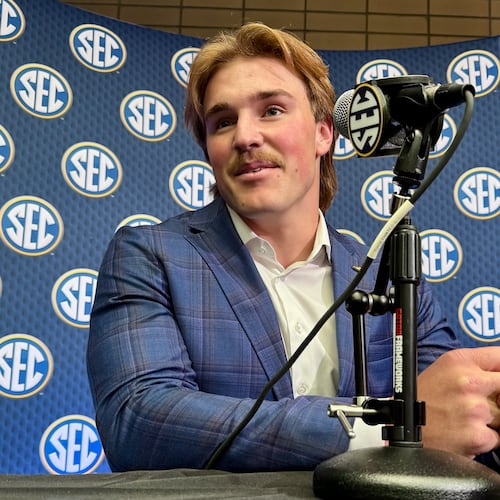If not for Gregg Marshall’s ability to set up video equipment, he might not be standing on the sidelines as Wichita State’s coach in the Final Four at the Georgia Dome.
Years ago, when Marshall was an assistant at Belmont Abbey, coach Kevin Eastman brought him along to a gathering of local coaches who met at a hotel off I-85 in Charlotte, N.C., to discuss X’s and O’s. Gene Little, Pat Dennis, Hal Nunnally, Marshall’s coach at Randolph-Macon, and Tubby Smith were there. College of Charleston coach John Kresse, who had just lost an assistant coach, also was there.
“I’m in the back making sure there’s coffee, making sure there’s cookies,” Marshall said. “I’m able to watch and listen, but I’m not a participant.”
With some prodding from the other coaches, Kresse and Marshall began talking basketball over lunch at a nearby restaurant. Kresse invited Marshall to his house at Kiawah, S.C., where Marshall interviewed while swimming in the family’s pool with Kresse’s twin boys on the Fourth of July.
“He was very bright guy who carried himself very professionally,” Kresse said. “He knew the game. I was just very impressed.”
Led by Kresse and powered by Marshall, who were together from 1988-96, Charleston transitioned from a power on the NAIA level to a surprise on the Division I level, with the Cougars reaching the NCAA tournament for the first time in 1994.
Marshall left in 1996 for an assistant’s job at Marshall before getting his first coaching job at Winthrop in 1998.
“I remember telling them my College of Charleston experience, I was not the architect, but I was the foreman, and I carried some bricks, I slung some mortar and I could steal the blueprint,” Marshall said. “They fell for it.”
Marshall wasn’t kidding. He took what he learned from Kresse and others and applied it to the Eagles, which he led to seven appearances in the NCAA tournament before leaving for Wichita State in 2007.
Danny Johnson, who was recruited by Marshall to play for Charleston after two years at Clemson, said he was walking through the airport with the Cougars and stopped to watch Winthrop in one of Marshall’s first trips to the NCAA tournament. The plays the Eagles were running were so recognizable that Johnson and his teammates called them out.
“He took the system that coach Kresse developed and boxed it up and took it to the other place,” said Johnson, who is a radio broadcaster for the Cougars. “But that says a lot about him. Most of us will take something and mess it up, and he took it and put his personal touch on it.”
Kresse said Marshall’s ability to take a team that lost its top five scorers from a year ago and now is on the verge of playing for a title enhances that reputation.
Kresse compared Marshall with Kentucky’s John Calipari, Villanova’s Jay Wright and Louisville’s Rick Pitino, the man Marshall will match wits with Saturday, for his ability to recruit, teach, motivate and entertain.
“He’s always had a natural feel for the game,” Kresse said. “He evaluates talent very well. He gets his players to overachieve, which is the ultimate goal of all coaches.”
The links in Marshall’s coaching chain, whose depths go to the Division III level, have given him a reputation as a coach’s coach, especially since he hasn’t chased more prestigious jobs in more prestigious conferences.
He told a story earlier this week of coaches from those lower levels reaching out to him before the Elite Eight game against Ohio State, in effect asking him to win it for all those in the fraternity who won’t get the same opportunity.
“Those people should feel part of that run to the Final Four just for me personally, to validate all of the great coaches out there that will never get a chance because of the level in which they coach,” he said.
Those roots and that respect run so deep that Marshall said he reached out to Kresse to analyze Louisville ahead of Saturday’s game.
“He was my Coach K (Krzyzewski),” Marshall said. “He remains my Coach K. He’s a dynamic coach.”
About the Author
Keep Reading
The Latest
Featured


